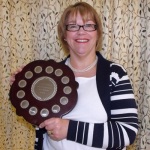Respiratory
RESPIRATORY CARE
The hospital respiratory service is supported by Consultant General Physicians and a visiting Specialist Respiratory Physician from NHS Greater Glasgow & Clyde.
Many investigations can be carried out locally and include;
- X Ray and CT scanning
- lung function tests/ Spirometry
- bronchial challenge testing
- oxygen assessment
- nebuliser assessment
- Mantoux testing and BCG Vaccination
- preliminary assessment of Sleep Apnoea.

Winner of 2012 Martin Shield from the Scottish Respiratory Nurse Forum – Telehealth monitoring for COPD Patients.
Katrina Flannigan is the Advanced Nurse in Respiratory Care and provides support to patients, carers and families of those living with chronic respiratory disease such as COPD, asthma, bronchiectasis and pulmonary fibrosis. Katrina can give advice and support to help patients and their carers control the symptoms of breathlessness, pain and distressing symptoms such as panic, anxiety and depression that can be associated with severe and late stage lung disease.
Education, support, optimisation of medication and oxygen assessment are all part of the care offered. Much of the care will be provided in a nurse-led clinic or your own home.
A strong multidisciplinary team approach is taken to improve communication and to decrease the duplication of work and improve your experience.
The specialist respiratory physiotherapist can help people with chronic lung diseases such as, COPD, Bronchiectasis and Interstitial lung disease that are having difficulty coping with their symptoms. In addition we can help people with breathing pattern disorders, dysfunctional breathing or hyperventilation syndrome.
Patients can be seen on an individual basis for breathing re-education, cough suppression or chest clearance techniques; or if shortness of breath on exertion and de-conditioning are the main problems then attendance at the Pulmonary Rehabilitation class could help.
Occupational Therapists can provide advice on aids to daily living, carry out assessments of need and supply equipment when required. They can also provide advice on relaxation techniques to aid coping with breathlessness.
